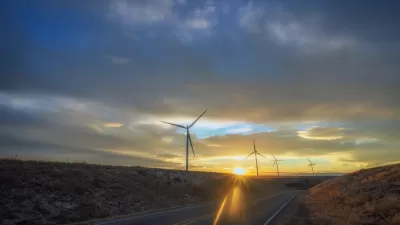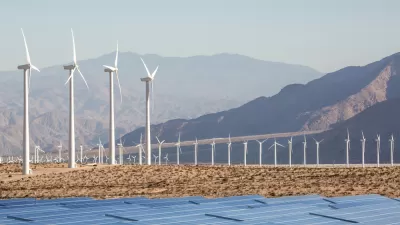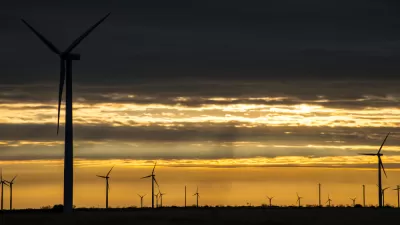The state aims to run on 100 percent renewable energy by 2045.

This year, California operated on 100 percent renewable energy for 100 days, marking a record for the state that included no blackouts or emergency power reductions, reports Alejandro Lazo for CalMatters. “That progress is largely due to the substantial public and private investments in renewable energy — particularly batteries storing solar power to use when the sun isn’t shining, according to energy experts.”
But more challenges lie ahead for the Golden State: a state law calls for 100 percent renewable energy by 2045, but natural gas remains the state’s biggest single source of energy. Meanwhile, unpredictable weather events can strain the grid and damage power infrastructure, and the growth of energy-guzzling data centers is drawing more of the state’s power supply.
The state has been able to avoid blackouts in part due to efforts to increase battery capacity. California has over 10,000 megawatts of battery capacity — the largest supply outside of China. According to Elliot Mainzer, chief executive of the California Independent System Operator, batteries “were a major difference-maker” in last month’s heat wave, which threatened to overload the grid.
FULL STORY: California hits milestones toward 100% clean energy — but has a long way to go

Planetizen Federal Action Tracker
A weekly monitor of how Trump’s orders and actions are impacting planners and planning in America.

Congressman Proposes Bill to Rename DC Metro “Trump Train”
The Make Autorail Great Again Act would withhold federal funding to the system until the Washington Metropolitan Area Transit Authority (WMATA), rebrands as the Washington Metropolitan Authority for Greater Access (WMAGA).

The Simple Legislative Tool Transforming Vacant Downtowns
In California, Michigan and Georgia, an easy win is bringing dollars — and delight — back to city centers.

The States Losing Rural Delivery Rooms at an Alarming Pace
In some states, as few as 9% of rural hospitals still deliver babies. As a result, rising pre-term births, no adequate pre-term care and harrowing close calls are a growing reality.

The Small South Asian Republic Going all in on EVs
Thanks to one simple policy change less than five years ago, 65% of new cars in this Himalayan country are now electric.

DC Backpedals on Bike Lane Protection, Swaps Barriers for Paint
Citing aesthetic concerns, the city is removing the concrete barriers and flexposts that once separated Arizona Avenue cyclists from motor vehicles.
Urban Design for Planners 1: Software Tools
This six-course series explores essential urban design concepts using open source software and equips planners with the tools they need to participate fully in the urban design process.
Planning for Universal Design
Learn the tools for implementing Universal Design in planning regulations.
Smith Gee Studio
City of Charlotte
City of Camden Redevelopment Agency
City of Astoria
Transportation Research & Education Center (TREC) at Portland State University
US High Speed Rail Association
City of Camden Redevelopment Agency
Municipality of Princeton (NJ)





























